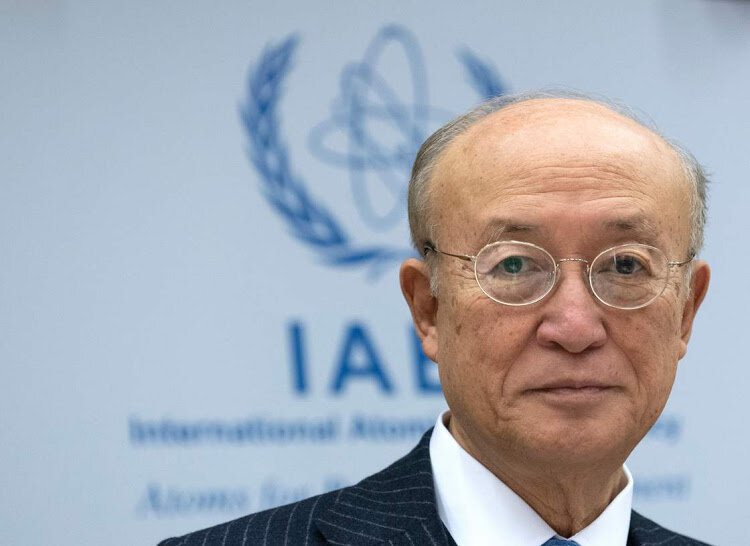Was foul play behind IAEA Chief Yukiya Amano’s death?

On Monday, an IAEA statement said the following: “The secretariat of the International Atomic Energy Agency regrets to inform with deepest sadness of the passing away of Director General Yukiya Amano.”
On July 18, he died at age-72 after heading the organization since 2009, no cause of death explained. Was it natural or otherwise? More on this below.
It’s believed Amano intended to step down before his third term expired in November 2021.
Reportedly he had health issues from an unspecified illness. Last September, the IAEA said he’d undergone an unexplained medical procedure, no further elaboration given about his health status.
His death came at a time of heightened tensions between Iran and the West because of Trump regime-led hostility toward the country.
During his tenure, he oversaw the landmark JCPOA nuclear deal’s adoption by its signatories and Security Council members, making it binding international law.
Iran’s Deputy Foreign Minister, Abbas Araghchi paid tribute to Amano following his death, saying:
“My deep condolences…We worked very closely” during JCPOA negotiations. “I commend his skillful and professional performance (that) resulted in complete closure. May the Almighty bless his soul.”
Vladimir Putin said he “always admired his wisdom and foresight - his ability to make informed decisions in the most difficult circumstances.”
It’s unclear who’ll succeed him. Deputy Director-General Mary Alice Hayward is serving as acting IAEA chief in the interim.
Since Security Council Resolution 2231 adopted the JCPOA, the IAEA affirmed Iran’s full compliance with its provisions 15 consecutive times.
No nation is more intensively monitored none more scrupulously in compliance with Nuclear Non-Proliferation Treaty (NPT) provisions and its other nuclear obligations.
Last October, in response to Israel’s Netanyahu falsely claiming Iran, seeks nuclear weapons, citing a (nonexistent) “secret atomic warehouse” in his UN General Assembly address, Amano refuted the accusation, saying:
“The agency sends inspectors to sites and locations only when needed. The agency uses all safeguards relevant to information available to it but it does not take (so-called intelligence) at face value.”
Without mentioning Israel or Netanyahu by name, Amano added that “(a)ll information obtained, including from third parties, is subject to rigorous review and assessed together with other available information to arrive at an independent assessment based on the agency’s own expertise.”
“In order to maintain credibility, the agency’s independence in relation to the implementation of verification activities is of paramount importance.”
Following Trump’s unlawful JCPOA pullout in May 2018, a week’s later IAEA June 8-dated quarterly report said the following:
“Since 16 January 2016 (JCPOA Implementation Day), the Agency has verified and monitored Iran’s implementation of its nuclear-related commitments in accordance with the modalities set out in the JCPOA, consistent with the Agency’s standard safeguards practices, and in an impartial and objective manner.”
“The Agency reports the following for the period since the issuance of the Director General’s previous quarterly report.”
“Iran has continued to permit the Agency to use on-line enrichment monitors and electronic seals which communicate their status within nuclear sites to Agency inspectors, and to facilitate the automated collection of Agency measurement recordings registered by installed measurement devices.”
The report, others preceding and following it, found Iran in full compliance with its JCPOA obligations, stating:
“Iran is implementing its nuclear-related commitments under the Joint Comprehensive Plan of Action.”
That status has not changed to this day. The Arms Control Association affirmed Iran’s compliance with Nuclear Non-Proliferation Treaty (NPT) and JCPOA provisions.
Based on Iran’s fulfillment of its NPT and JCPOA obligations, no justification exists for imposing nuclear-related sanctions on the country — by the Security Council, the only body authorized to impose them, not individual nations on their own.
Unilaterally imposed US sanctions on Iran and other nations constitute economic terrorism. They breach UN Charter Article 41, stating:
The Security Council is empowered to decide what actions may be used to enforce international law — including “complete or partial interruption of economic relations and severance of diplomatic relations,” other than use of military force.
When Article 41 steps don’t work, Article 42 authorizes Security Council members to “take such action by air, sea, or land forces as may be necessary to maintain or restore international peace and security” — by use of “demonstrations, blockade,” or military intervention.
The Security Council alone may authorize going this far — not presidents, prime ministers, lawmakers, or judicial bodies of member states.
Leave a Comment